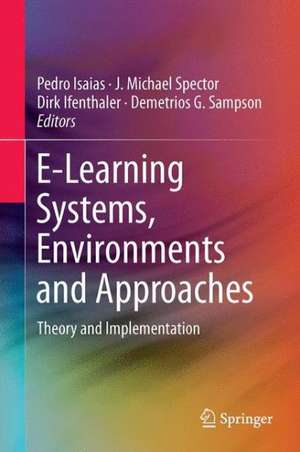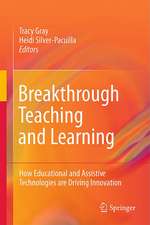E-Learning Systems, Environments and Approaches: Theory and Implementation
Editat de Pedro Isaías, J. Michael Spector, Dirk Ifenthaler, Demetrios G. Sampsonen Limba Engleză Hardback – 23 mar 2015
| Toate formatele și edițiile | Preț | Express |
|---|---|---|
| Paperback (1) | 391.61 lei 43-57 zile | |
| Springer International Publishing – 6 oct 2016 | 391.61 lei 43-57 zile | |
| Hardback (1) | 398.92 lei 43-57 zile | |
| Springer International Publishing – 23 mar 2015 | 398.92 lei 43-57 zile |
Preț: 398.92 lei
Nou
Puncte Express: 598
Preț estimativ în valută:
76.33€ • 79.91$ • 63.16£
76.33€ • 79.91$ • 63.16£
Carte tipărită la comandă
Livrare economică 07-21 aprilie
Preluare comenzi: 021 569.72.76
Specificații
ISBN-13: 9783319058245
ISBN-10: 331905824X
Pagini: 300
Ilustrații: XXIII, 329 p. 68 illus., 43 illus. in color.
Dimensiuni: 155 x 235 x 25 mm
Greutate: 0.67 kg
Ediția:2015
Editura: Springer International Publishing
Colecția Springer
Locul publicării:Cham, Switzerland
ISBN-10: 331905824X
Pagini: 300
Ilustrații: XXIII, 329 p. 68 illus., 43 illus. in color.
Dimensiuni: 155 x 235 x 25 mm
Greutate: 0.67 kg
Ediția:2015
Editura: Springer International Publishing
Colecția Springer
Locul publicării:Cham, Switzerland
Public țintă
ResearchCuprins
Part I. Exploratory Learning Technologies.- Measuring Problem Solving Skills in Portal 2.- iPads in Inclusive Classrooms: Ecologies of Learning.- Supporting the Strengths and Activity of Children with Autism in a Technology-Enhanced Learning Environment.- The Cognitive Cost of Chatting while Attending a Lecture: A Temporal Analysis.- Learning with the Simple show.- Using Loop Learning and Critical Dialogue in Developing Innovative Literature Reviews.- The Contributions of Digital Concept Maps to Assessment for Learning Practices.- Part II. e-Learning Social Web Design.- Intelligent Tutors in Immersive Virtual Environments.- Journal of Exploration on the Way Towards Authentic Learning Environments.- The Configuration Process of a Community of Practice in the Collective Text Editor.- Context-Based Semantic Annotations in Copes: An Ontological and Rule-Based Approach.- Model of Emotional Expressions in Movements.- Student-Driven Classroom Technologies: Transmedia Navigation and Transformative Communications.- Perceived Affordances of a Technology-Enhanced Active Learning Classroom in Promoting Collaborative Problem Solving.- Using a Facebook Group as a Forum to Distribute, Answer and Discuss Content: Influence on Achievement.- Part III. Learner Communities through e-Learning Implementations.- ICT Support for Collaborative Learning - A Tale of Two Cities.- Students' Facebook Usage and Academic Achievement: A Case Study of Private University in Thailand.- The Investigation of Pre-Service Teachers' Concerns about Integrating Web 2.0 Technologies into Instruction.- Interactive Technologies for Teacher Training: Comparing Performance and Assessment in Second Life and Simschool.- A Study on Improving Information Processing Abilities Based on PBL.- Part IV. Collaborative and Student-Centered e-Learning Design.- Piaget, Inhelder and Minecraft.- Using Generic and Context-Specific Scaffolding to Support Authentic Science Inquiry.- Leverage Learning in the UniversityClassroom.- Data Challenges of Leveraging a Simulation to Assess Learning.- Self-Assessment and Reflection in a 1st Semester Course for Software Engineering Students.- Don't Waste Student Work: Using Classroom Assignments to Contribute to Online Resources.- The Ancestor Project: Aboriginal Computer Education through Storytelling.- Index.
Notă biografică
Pedro Isaías is an associate professor at Universidade Aberta (Portuguese Open University) in Lisbon, Portugal, responsible for several courses and director of the master degree program in Electronic Commerce and Internet since its start in 2003. He is co-founder and president of IADIS – International Association for Development of the Information Society, a scientific non-profit association. He holds a PhD in Information Management (in the speciality of information and decision systems) from the New University of Lisbon. Author of several books (both as author/co-author and editor/co-editor), journal and conference papers and research reports, all in the information systems area, he has headed several conferences and workshops within the mentioned area. He has also been responsible for the scientific coordination of several EU funded research projects. J. Michael Spector is Chair of Learning Technologies in the College of Information at the University of North Texas. His recent research is in the areas of intelligent support for instructional design, system dynamics based learning environments, assessing learning in complex domains, distance learning and technology integration in education. Dr. Spector served on the International Board of Standards for Training, Performance and Instruction (IBSTPI) as Executive Vice President; he is on the Executive Committee of the IEEE Learning Technology Technical Committee and is Past-President of the Association for Educational and Communications Technology (AECT). He is the editor of the Development Section of Educational Technology Research & Development, and he serves on numerous other editorial boards. He co-edited the third and fourth editions of the Handbook of Research on Educational Communications and Technology, and has more than 100 journal articles, book chapters and books to his credit. Dirk Ifenthaler is the Director, Centre for Research in Digital Learning at Deakin University. His previous rolesinclude Manager of Applied Research and Learning Analytics at Open Universities Australia, Affiliate Research Scholar at the University of Oklahoma, USA, and Interim Department Chair and Professor for Educational Science at the University of Mannheim, Germany. Professor Ifenthaler was a 2012 Fulbright Scholar-in-Residence at the Jeannine Rainbolt College of Education, the University of Oklahoma, USA. Dirk's background is in cognitive psychology, educational technology, statistics, and teacher education. He developed automated and computer-based methodologies for the assessment, analysis and feedback of graphical and natural language representations. His research outcomes include numerous co-authored books, book series, book chapters, journal articles and international conference papers. Dirk is the Editor-in-Chief of Technology, Knowledge and Learning and a member of the Editorial Board for Educational Technology Research and Development. He is the 2013-2014 President for the AECT (Association for Educational Communications and Technology) Division Design and Development, 2013-2014 Chair for the AERA (American Educational Research Association) Special Interest Group Technology, Instruction, Cognition and Learning and Co-Program Chair for the international conference on Cognition and Exploratory Learning in the Digital Age (CELDA). Dirk received the 2012 Outstanding Journal Article Award by AECT, 2009 Outstanding Reviewer Award for Educational Technology Research and Development and the 2006 Outstanding Dissertation Award by the University of Freiburg, Germany. Demetrios G. Sampson has received a Diploma in Electrical Engineering from the Democritus University of Thrace, Greece in 1989 and a Ph.D. in Electronic Systems Engineering from the University of Essex, UK in 1995. He is a Professor of Digital Systems for Learning and Education at the Department of Digital Systems, University of Piraeus, Greece and a Research Fellow at the Information Technologies Institute (ITI), Centre of Research and Technology Hellas (CERTH). He is the Founder and Director of the Advanced Digital Systems and Services for Education and Learning (ASK) since 1999. His main scientific interests are in the area of Learning Technologies. He is the co-author of more than 310 publications in scientific books, journals and conferences with at least 1370 known citations (h-index: 20). He has received 6 times Best Paper Award in International Conferences on Advanced Learning Technologies. He is a Senior and Golden Core Member of IEEE and he was the elected Chair of the IEEE Computer Society Technical Committee on Learning Technologies (2008-2011). He is Co-Editor-in-Chief of the Educational Technology and Society Journal (impact factor 1.171, 2012). He is also a Member of the Steering Committee of the IEEE Transactions on Learning Technologies, Member of the Advisory Board of the Journal of King Saud University - Computer and Information Sciences, Member of the Editorial Board of 20 International/National Journals and a Guest Co-Editor in 26 Special Issues of International Journals. His participation in the organization of scientific conferences involves: General and/or Program Committee Chair in 35 International Conferences, Program Committees Member in 330 International/National Scientific Conferences. He has been a Keynote/Invited Speaker in 48 International/National Conferences. He has been project director, principle investigator and/or consultant in 65 R&D projects with external funding at the range of 14 Million € (1991-2016). He is the recipient of the IEEE Computer Society Distinguished Service Award (July 2012).
Textul de pe ultima copertă
The volume consists of twenty-five chapters selected from among peer-reviewed papers presented at the CELDA (Cognition and Exploratory Learning in the Digital Age) 2013 Conference held in Fort Worth, Texas, USA, in October 2013 and also from world class scholars in e-learning systems, environments and approaches. The following sub-topics are included: Exploratory Learning Technologies (Part I), e-Learning social web design (Part II), Learner communities through e-Learning implementations (Part III), Collaborative and student-centered e-Learning design (Part IV). E-Learning has been, since its initial stages, a synonym for flexibility. While this dynamic nature has mainly been associated with time and space it is safe to argue that currently it embraces other aspects such as the learners’ profile, the scope of subjects that can be taught electronically and the technology it employs. New technologies also widen the range of activities and skills developed in e-Learning. Electronic learning environments have evolved past the exclusive delivery of knowledge. Technology has endowed e-Learning with the possibility of remotely fomenting problem solving skills, critical thinking and team work, by investing in information exchange, collaboration, personalisation and community building.
Caracteristici
Presents papers from the 2013 CELDA Conference Represents the very latest work in the area where internet, technology and instructional design intersect Includes contributions from professionals in a variety of disciplines, including education, psychology, instructional design and information technology Includes supplementary material: sn.pub/extras

